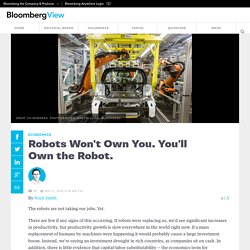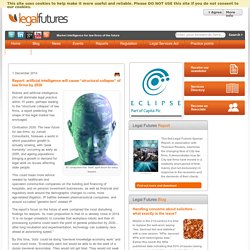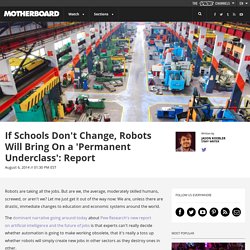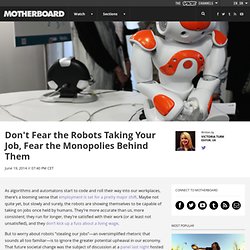

Robots Won't Own You. You'll Own the Robot. The robots are not taking our jobs.

Yet. There are few if any signs of this occurring. If robots were replacing us, we’d see significant increases in productivity, but productivity growth is slow everywhere in the world right now. If a mass replacement of humans by machines were happening it would probably cause a large investment boom. Instead, we're seeing an investment drought in rich countries, as companies sit on cash. Young people 'feel they have nothing to live for' As many as three quarters of a million young people in the UK may feel that they have nothing to live for, a study for the Prince's Trust charity claims.

The trust says almost a third of long-term unemployed young people have contemplated taking their own lives. Urgent action must be taken to prevent the young jobless becoming the young hopeless, it says. The government commented that it was doing "everything possible" to help young people find work. Last month, figures from the Office for National Statistics showed the UK unemployment rate had fallen to its lowest level since 2009, with the number of people out of work falling by 99,000 to 2.39 million in the three months to October.
Samsung Announces Plans To Replace Human Factory Workers With Robots By 2018. Cracked. Prof-Stephen-Hawking comments on Science AMA Series: Stephen Hawking AMA Answers! This Artificially Intelligent Boss Means the Workplace Will Never Be the Same. The Rise of Automated Cars Will Kill Thousands of Jobs Beyond Driving. Youtube. Robot-writing increased AP’s earnings stories by tenfold. Since The Associated Press adopted automation technology to write its earnings reports, the news cooperative has generated 3,000 stories per quarter, ten times its previous output, according to a press release from Automated Insights, the company behind the automation.

Those stories also contained “far fewer errors” than stories written by actual journalists. The Associated Press began publishing earnings reports using automation technology in July for companies including Hasbro Inc., Honeywell International Inc. and GE. Appended to those stories is a note that reads “This story was generated automatically by Automated Insights ( using data from Zacks Investment Research. Full GE report: The stories include descriptions of each business and contain “forward-looking guidance provided by the companies,” according to the release. LEGAL FUTURES Report: artificial intelligence will cause "structural collapse" of law firms by 2030. 1 December 2014 AI: computers that ‘think’ spell doom for many lawyers Robots and artificial intelligence (AI) will dominate legal practice within 15 years, perhaps leading to the “structural collapse” of law firms, a report predicting the shape of the legal market has envisaged.

Civilisation 2030: The near future for law firms, by Jomati Consultants, foresees a world in which population growth is actually slowing, with “peak humanity” occurring as early as 2055, and ageing populations bringing a growth in demand for legal work on issues affecting older people. This could mean more advice needed by healthcare and specialist construction companies on the building and financing of hospitals, and on pension investment businesses, as well as financial and regulatory work around the demographic changes to come; more age-related litigation, IP battles between pharmaceutical companies, and around so-called “geriatric-tech” related IP. CYugpAh.png (PNG Image, 813 × 4396 pixels) - Scaled (22%)
If Schools Don't Change, Robots Will Bring On a 'Permanent Underclass': Report. Robots are taking all the jobs.

But are we, the average, moderately skilled humans, screwed, or aren't we? Let me just get it out of the way now: We are, unless there are drastic, immediate changes to education and economic systems around the world. The dominant narrative going around today about Pew Research's new report on artificial intelligence and the future of jobs is that experts can't really decide whether automation is going to make working obsolete, that it's really a toss up whether robots will simply create new jobs in other sectors as they destroy ones in other. Don't Fear the Robots Taking Your Job, Fear the Monopolies Behind Them. As algorithms and automatons start to code and roll their way into our workplaces, there’s a looming sense that employment is set for a pretty major shift.

Maybe not quite yet, but slowly and surely, the robots are showing themselves to be capable of taking on jobs once held by humans. They’re more accurate than us, more consistent; they run for longer, they’re satisfied with their work (or at least not unsatisfied), and they don’t kick up a fuss about a living wage. But to worry about robots “stealing our jobs”—an oversimplified rhetoric that sounds all too familiar—is to ignore the greater potential upheaval in our economy. That future societal change was the subject of discussion at a panel last night hosted by Nesta in London, which brought figures from the fields of technology and economics together to share some of the visions conjured by their crystal balls. These Are The Surprising Jobs You'll Be Doing By The 2030s.
Republicans Believe Uber Will Help Them Win Back America's Cities.